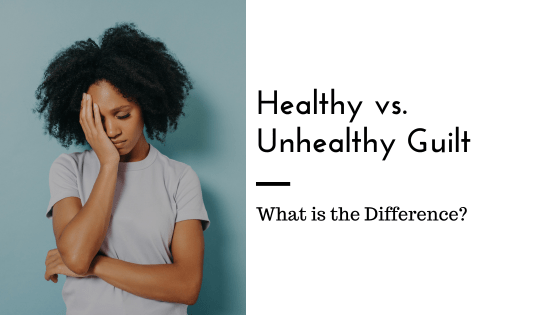
Guilt is that pesky, sometimes heavy, feeling that pops up when we feel we have done something wrong. Guilt serves us well when indicating that we have done something we need to make amends for. However, guilt can negatively impact us when it regularly surfaces for imaginary or manipulated reasons.
This blog post explores health and unhealthy guilt and its effects on our lives. Keep reading to learn about healthy vs. unhealthy guilt and gain insight into some strategies for managing guilt and embracing a healthier mindset.
What is Guilt?
Guilt involves a sense of regret or responsibility for our actions. It is a feeling resulting from thinking you did something wrong. It is an emotional state typically characterized by feeling remorseful. It is also common to practice self-blaming and have an overwhelming sense that you made a mistake. Guilty feelings often occur after taking personal action but may manifest after thoughts or perceived failures. Unmanaged guilt can lead to distress and negatively impact your mental health. However, guilt can also be a healthy feeling and a powerful moral compass.
Healthy Guilt
Healthy guilt is a normal, constructive emotional response to a genuine mistake. It can serve as a valuable aspect of our self-consciousness. It can provide insight into personal errors, help us take responsibility for our actions, and make amends when appropriate. Healthy guilt promotes positive personal growth by encouraging empathy and a commitment to uphold our values and ethical standards. Healthy guilt is proportional and rational. It is a healthy part of the human experience.
Unhealthy Guilt
Unhealthy guilt involves feeling guilty for imagined actions or situations out of our control or already amended actions. Feelings of shame often accompany it through excessive self-blame and self-punishment. Unhealthy guilt is characterized by irrational feelings of unworthiness and persistent feelings of being inherently flawed. It is disproportionate and misplaced. Triggers for unhealthy guilt include unrealistic expectations, trauma, perfectionism, or manipulation by others. Unhealthy guilt contributes negatively to depression, anxiety, and other mental health conditions.
Healthy Guilt vs. Unhealthy Guilt
The difference between unhealthy vs. healthy guilt involves several factors, including the source and proportion of the guilty feeling. Healthy guilt is helpful, it brings psychological discomfort about actions taken that are objectively wrong. But, unhealthy guilt is less of a guide and can bring psychological distress about something imagined, manipulated, or out of our control.
Healthy guilt often leads to positive behavioral changes. It allows us to seek forgiveness and make amends for wrongs. Healthy guilt can lead to healing. The outcome of unhealthy guilt is negative. Unhealthy guilt often leads to self-punishment instead of behavior change.
Embrace Healthy Guilt
Healthy guilt can help you make positive behavior changes. It is your conscious voice and inner voice that works as a moral and ethical compass. In some circumstances, healthy guilt can work as an emotional braking system, telling you to stop a behavior you may later regret. Healthy guilt helps us monitor our behavior and do the right thing more often than not. Embracing healthy guilt is as simple as listening to your inner voice before you take action. When you feel guilty following an action, embracing healthy guilt may involve apologizing and making amends for wrongdoing.
Managing Unhealthy Guilt
Unhealthy guilt results from circumstances outside your control, but some practical strategies can help you manage unhealthy guilt.
- Determine if your guilt is healthy or unhealthy. Because the two feelings feel the same, looking for evidence about your guilty feelings is critical to determine whether they are appropriate. Look for evidence at the source of your guilt that will tell you if your guilt is healthy or not. The first step in managing unhealthy guilt is naming it—unhealthy.
- Be realistic about what you can control. Make a list of what you can control about a situation and what you cannot. Then remind yourself that you can only be responsible for your actions about what you can control.
- Affirmations. Positive affirmations are one way to quiet down negative thoughts and self-talk.
- Challenge unrealistic high standards. Unrealistically high standards can result in unhealthy guilt when those standards are not met or maintained. Challenge them with more realistic standards you are capable of reaching.
- Set healthy boundaries. Decide what you are willing and able to do in certain situations and communicate boundaries clearly with family, friends, co-workers, and any other person or group that places expectations on you.
- Practice self-care. Activities that promote your health and well-being can help you overcome overwhelming feelings of unhealthy guilt. Self-care activities include anything you do for yourself, well-being, and personal enjoyment. For example, exercise, hobbies, a spa day, reading a book, or any activities that help you relax.
- Seek professional help when needed. When unhealthy guilt is overwhelming and persistent, significantly impacting your life, it is time to consider seeking help from a mental health professional.
Love Heal Grow
Love Heal Grow Therapy group in Sacramento, California, offers local in-person and online therapy throughout California. We are dedicated to supporting your mental health healing and personal growth journey. Our team of compassionate, experienced therapists offers a safe and nurturing environment for youtube to explore your emotions, including overwhelming feelings of guilt. We use evidence-based therapy techniques, providing services, including individual therapy, couples counseling, and family therapy.
You can start your healing journey today. Contact us to schedule an appointment.
























